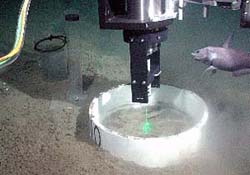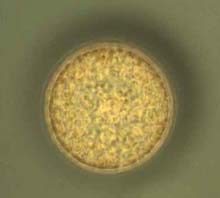Study raises questions about potential impact of climate change
A study has shown that marine life around the world is surprisingly dependent on a single ocean circulation pattern in the Southern Hemisphere where nutrient-rich water rises from the deep and spreads across the seas.
The results suggest that ocean life may be more sensitive to climate change than previously believed because most global warming predictions indicate that major ocean circulation patterns will cha
A team of scientists has discovered bacteria in a hole drilled more than 4,000 feet deep in volcanic rock on the island of Hawaii near Hilo, in an environment they say could be analogous to conditions on Mars and other planets.
Bacteria are being discovered in some of Earth’s most inhospitable places, from miles below the ocean’s surface to deep within Arctic glaciers. The latest discovery is one of the deepest drill holes in which scientists have discovered living organisms encas

Trapping carbon dioxide in an icy age
In collaboration with oceanographers from the Monterey Bay Aquarium Research Institute (MBARI), a team of geologists at Washington University in St. Louis is using a rare instrument on the ocean floor just west of California. One of their earliest projects was to see if it’s possible to capture carbon dioxide from the atmosphere and store it on the ocean floor. The research is supported by the Department of Energy.
The geologists,
Biologists unravel part of the mystery behind disappearance of shell material
Chitin, the Earth’s second-most abundant biological material, is a major component in the flurry of skeletal debris discarded daily by crustacean creatures in the world’s oceans. If left undisturbed, this tough insoluble material, a cousin to cellulose, would pile up on the ocean’s floor and wreak havoc with marine ecosystems. Fortunately, armies of bacteria act as chitin’s cleanup crew,

Biologists from the Royal Netherlands Institute for Sea Research have demonstrated that desert dust promotes the growth of algae. Scientists had already assumed that the iron in desert dust stimulated algal growth, but this has now been demonstrated for the first time. The researchers have published their findings in the December issue of the Journal of Phycology.
The biologists cultured two species of diatoms in seawater originating from the iron-depleted Southern Ocean, the sea around the
Size matters, and colder temperatures make things bigger! This is true not just for most large furry animals and for birds, but also for the microscopic plants and animals that are at the base of the ocean’s food chain.
Scientists have long known that animals and plants are usually larger when they grow in colder environments. Now, for the first time David Atkinson, Ben Ciotti, and David Montagnes, from the University of Liverpool’s School of Biological Sciences, have found that this o